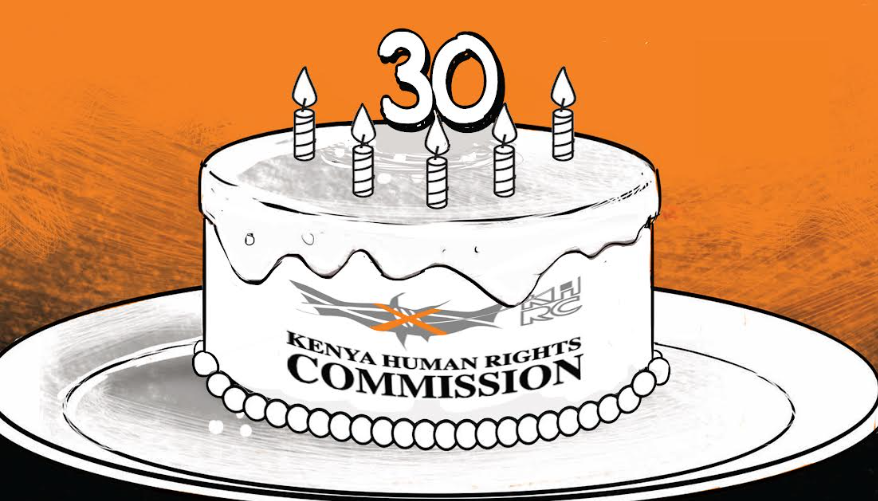

If you had asked me a year ago to name the most influential organisations in Kenya’s
human rights landscape, I would have rattled off a few familiar names with
confidence.
However, when I began working on a book chronicling the Kenya Human Rights Commission's 30-year legacy in Kenya, my confidence quickly gave way to a humbling realisation: I had vastly underestimated the scope and impact of the KHRC’s work.
The resulting 306-page book Rights & Fights: 30 Years of the Kenya Human Rights Commission's Impactful Legacy, was launched by the KHRC team last evening at Sarova Panafric.
Capturing three eventful decades in a single volume is akin to distilling a high-stakes, goal-packed 90-minute football match into a 30-second highlight reel. It’s ambitious, imperfect, but essential. Like the best highlights, it also delivers moments that stay with you long after the final whistle.
As I dug deeper into the KHRC's history through conversations with current and former team members, beneficiaries and partners across the organisation's varied programmes, the more acutely aware I became of the depth of my ignorance.
It was a humbling realisation and one that underlines the profound significance of the KHRC’s achievements over the past three decades.
Now, you might be wondering, what precisely has the KHRC accomplished? The short answer? A great deal.
Birthed in exile on April 9, 1992, in Washington, DC, the Kenya Human Rights Commission was the brainchild of now household names Prof Makau Mutua, Maina Kiai, Willy Mutunga, Kiraitu Murungi and Prof Peter Kareithi. Kiai helped the KHRC make the bold leap to Kenya in defiance of an oppressive one-party state.
For over three decades, the KHRC has consistently championed the disenfranchised, holding governments and corporations accountable, even at great risk to itself. The KHRC’s story is one of both visible triumphs and quieter, systemic changes that have profoundly shaped our country.
One of the most notable successes of the KHRC is its role in securing justice for Mau Mau torture victims. In collaboration with the Mau Mau War Veterans’ Association, the organisation litigated against the British government, culminating in compensation for long-overlooked survivors of colonial-era atrocities.
The commission’s fingerprints are also evident in the drafting and advocacy of Kenya’s 2010 Constitution.
The KHRC’s advocacy has often targeted some of Kenya’s most entrenched injustices. In the horticulture sector, it exposed unsafe working conditions and labour abuses that left workers like Anita Gacheri, a flower farm employee, blind and jobless at the age of 24.
Through its Kenya Horticulture Project, the KHRC not only amplified such stories but also drove meaningful reforms. Today, flower farms are markedly safer workplaces, thanks in small part to the work done by the KHRC and its grassroots partners.
Beyond labour rights, the KHRC has championed the land rights of marginalised communities, such as the Ngaaie and Nguluku, who faced displacement due to land grabbing.
It has documented and exposed extrajudicial killings, torture and discrimination, ensuring that the state and other actors are held accountable for violations. The KHRC has also been a staunch advocate for electoral integrity.
Since 1992, it has monitored elections, exposed irregularities and pushed for electoral reforms to safeguard democracy.
Perhaps the most striking aspect of the KHRC’s legacy is its ability to incubate and nurture other radical NGOs, thereby strengthening Kenya’s civil society. This ripple effect has amplified the KHRC’s impact and ensured that the struggle for human rights is sustained across generations and institutions.
Former US Secretary of State Madeleine Albright once remarked about the United Nations: “If it didn’t exist, we would have to invent it.” The same can be said of the KHRC. Its role as Kenya’s moral conscience cannot be overstated.
The book was a team effort. My deepest gratitude goes to everyone on the KHRC team, past and present, who generously shared their time and insights with me during the writing of ‘Rights & Fights’. Their first-hand accounts enriched the project immeasurably.
My sincere hope is that the book ignites a passion for justice in
readers and inspires a new generation to champion the KHRC’s vision of Kenya as a
human rights state.





![[PHOTOS]: Ruto meets security chiefs at State House, Nairobi](/_next/image?url=https%3A%2F%2Fcdn.radioafrica.digital%2Fimage%2F2025%2F06%2Fc4c42fa7-00eb-43a9-81a8-aff44a446021.jpg&w=3840&q=100)




![[PHOTOS]: Promotion of Army chiefs at State House](/_next/image?url=https%3A%2F%2Fcdn.radioafrica.digital%2Fimage%2F2025%2F06%2Fc189c693-1b07-42a4-b814-0471bd65f443.jpeg&w=3840&q=100)
